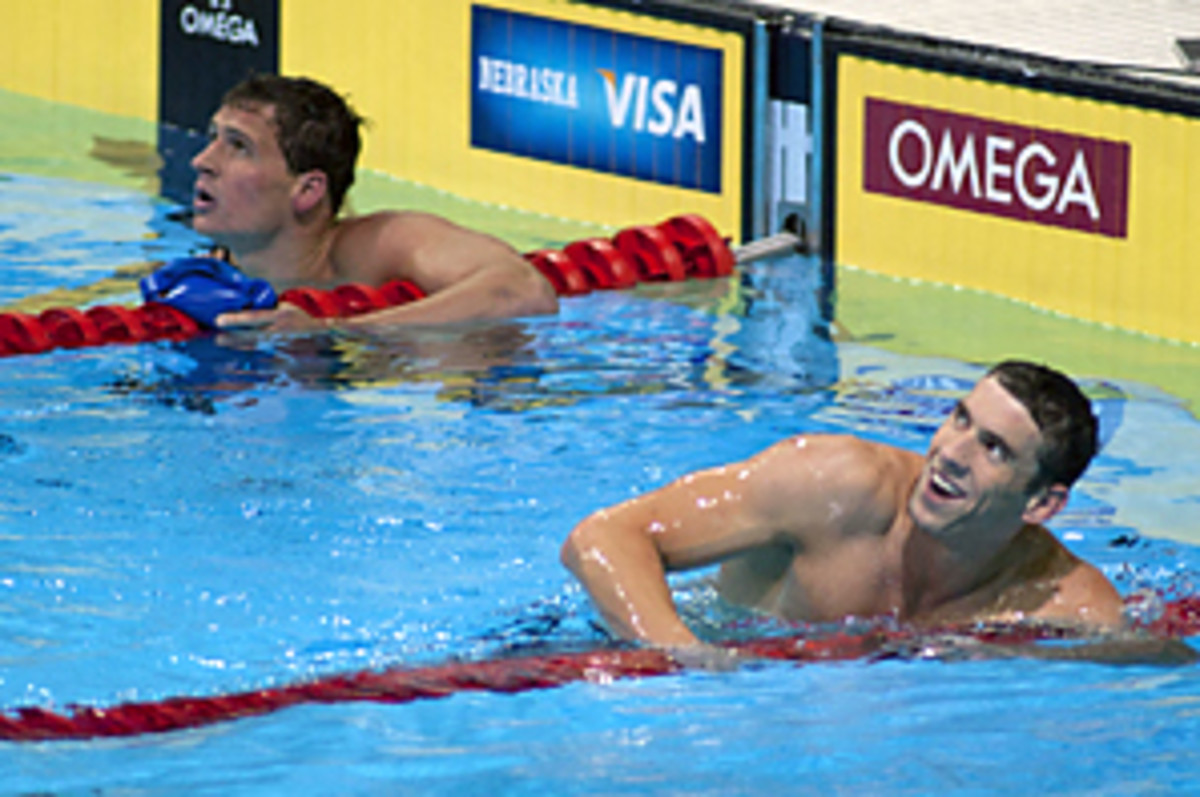
Phelps-Lochte was another classic
The race was almost everything the crowd could have asked of the two best swimmers in the world. It was thrilling. It was decided on the last stroke. It was an evening of the score. And it was a perfect setup to a likely rubber match in the 200 individual medley on Saturday night. There was just one problem: It wasn't very fast. "In my eyes, 1:45.7 is not going to make the medal podium (in London)," said Phelps.
Lochte knows it, too. Though he told the media afterward the race had been the "dogfight" he had expected and he was happy with his time, on the awards podium later he said to Phelps, referring to the stacked international 200 free field they'll face in London, "I guess we're going to have to take it out a lot faster. "
Phelps and Lochte have raced each other so often now, they've developed a curious habit of paying more attention to each other than to their pace. "When we're next to each other we kind of play cat-and-mouse," says Phelps. "We don't just sort of jump out after it like we have in the past. We see what each other does and play it out by feel the first couple laps. When it comes down to it, we put every ounce of energy into the last fifty."
Phelps' coach, Bob Bowman, noticed this tendency years ago when the two first started racing each other. He and Lochte's coach, Gregg Troy, discussed it, and for awhile the two swimmers raced each other as they would other competitors. But they have slipped into old habits. "When Michael and Ryan are so focused on racing each other they do stuff like tonight (and don't) take it out fast," says Bowman. "Tonight Michael got out a little bit ahead. He thinks 'I'm ahead of Ryan, I'm doing fine,' Ryan is, like, 'I'm going to stay close enough so I can make my move.' He makes his move, they do the cat-and-mouse and who can outtouch each other, and in the process they forgot to swim fast."
Aside from the matter of speed, Phelps and Bowman were happy with the swim and the win. Unlike at the world championships in Shanghai last summer, when Lochte clobbered Phelps on the final turn and held him off for the victory that set the stage for the rivalry hoopla that has gripped the swimming world for the last year, Phelps' turns were good, particularly his momentum coming out of them. And, unlike Tuesday night's semi, when Lochte outtouched Phelps by .02 in 1:46.25, Phelps didn't lift his head before he touched the wall. It's a significant mistake he noticed when watching video of that semi. "Coming into the wall (tonight), I kept saying 'Keep my head down, keep my head down' because last night I was looking at the scoreboard about five meters out from the wall. I wanted to correct that tonight."
Although Phelps has scratched out of Thursday morning's 100 freestyle preliminaries -- he and Bowman believe his March time of 48.49 will be good enough to land him on the Olympic 4x100 free relay -- his program in London is likely to be identical to Beijing's. That's eight events, but Bowman cautions against expectations of another eight gold medals.
"The odds of that happening again are infinitesimal," he said. "Think about how it happened last time. For that to happen you have to not only be perfectly prepared and on your game, you have to get some breaks. We got two breaks." -- hitting the wall just right to outtouch Milorad Cavic in the 100 fly and Jason Lezak's out-of his-mind, come-from-behind anchor leg in the 4x100 free, the fastest relay split in history.
"That was beyond," says Bowman of Lezak's swim. "How many of those are you going to get -- in a lifetime?"
Another barrier to a golden haul is the competition Phelps will face in London. "There are a lot better competitors overall than what he had last time," says Bowman. The most formidable is the guy Phelps has become accustomed to seeing in the next lane, who doesn't like losing any more than Phelps does. Whether it's cat-and-mouse or dogfight or a little of both, a third Phelps-Lochte showdown in the 200 IM on Saturday should be another instant classic.




